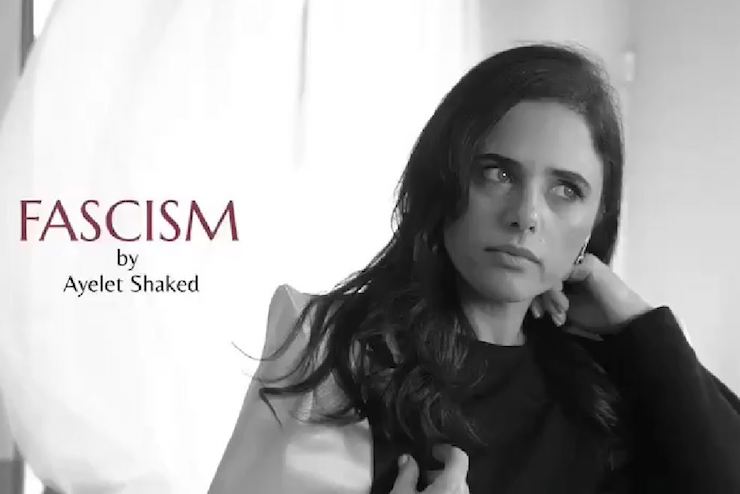A new campaign ad by Justice Minister Ayelet Shaked signals that this time around, only the far right is talking about democratic norms — and how to undo them. Does the opposition have a response?

Of all the aspects of political campaigns that voters love to hate, none is more maligned than the political advertisement. The term “30-second spot” has become synonymous with dumbing down, mudslinging, and manipulation of political campaigns ever since the Daisy Ad.
But punchy ads are great. They can help de-code the strategy each party has chosen, and short scripts packed with narrative are enormously revealing about the country’s electorate, seen through the eyes of the candidates. Political campaigns are us, the voters, reflected back to ourselves – even if we don’t like what we see.
This week, Israelis looked into the campaign mirror and saw Justice Minister Ayelet Shaked, with the ad that launched a thousand memes and at least as many headlines. In just 44 seconds and with only five essential words, Shaked redefined democracy in Israel.
In a mock-up of the familiar “Obsession” perfume ads, a vixen-voiced narrator lists the minister’s policies to weaken and restrain the Israeli justice system. “Judicial revolution,” she purrs, “reducing [judicial] activism, appointing judges, governance, separation of powers, reigning in the Supreme Court.” The ad sarcastically refers to these policies as bottled “fascism.” Shaked then lifts a bottle of perfume towards her face, sprays and utters the five critical words: “Smells like democracy to me.”
The ad crystallizes a bitter divide of this election that has bubbled below the surface for years. Shaked didn’t just say “the court needs to be restrained” or “I’m against judicial activism.” She said that these positions are democracy itself.
On one side of the divide lies Israelis who believe that the Supreme Court is among the most important state institutions, an essential check on other branches of government. They view the assault on the court by right-wing governments of recent years as an attack on democracy itself.
The other camp views the court as an unelected leftist group of elites, who uphold human and civil rights of minorities – even Palestinians. This side is not necessarily against human rights – there are few complaints when the court rules against accepting evidence of Jewish suspects whose rights were violated in the process. It’s the universal bit about human rights that makes them angry. And in fact, Israel’s Supreme Court has upheld the country’s policies of occupation at least as often as it modifies them. Yet the image that the court helps Palestinians endures.
And for these voters, judicial activism itself tramples the will of the majority — Jews. Their antidote is policies that favor the majority, manifested by the elected legislature; hence Shaked’s quest to give the Knesset greater control over the courts. For the justice minister, and in Israel more broadly, democracy is being redefined as minimally-restrained majority rule, based on constitutional anchors such as the Nation-State law, and accompanied by national triumphalism.
With her ad, Israel’s justice system is on trial and Shaked is the prosecutor.
On this issue, the jury is not divided by typical left/right/center lines. In my December survey for Israeli anti-occupation organization B’Tselem, a plurality of moderate right-wingers gave the court a “favorable” rating. Among the hard-right-wing respondents, twice as many gave the court a negative rating compared to positive. It’s clear which side Shaked is vying for.
Her New Right party is fighting to wrest votes from The Union of Right-Wing Parties (which includes the Kahanist Jewish Power party). That far-far right party is also fighting over the judiciary: Rafi Peretz, leader of the Union, said on Wednesday that his party would demand the Justice Ministry in a future government, so that the “Supreme Court will know its place,” while his Kahanist consort Itamar Ben-Gvir vowed to “put an end to the government of the Supreme Court.”

The New Right and Union of Right-Wing parties are both poised to enter Knesset; they might even become leading coalition partners. If so, one is likely to get the Justice Ministry. Aggressive policies will follow – most prominently, the “Override Bill,” which will make it easier for the Knesset to override judicial review. The right-wing is convinced the court only rules against legislation that they believe favors Jewish national interests; violating the will of the legislature – a reflection of the Jewish majority.
Given the stakes, surely defenders of Israel’s democracy are putting up a fight. But judging by the ads, it’s a one-sided battle.
Netanyahu’s closest challenger, Benny Gantz’s Blue and White party, has focused primarily on, well, replacing Netanyahu. Their ads attack the Likud for corruption, without connecting this to the larger issues of governance or democracy. In fact it’s hard to pinpoint any national issue as the heart of the party’s agenda.
The Labor Party, head of the opposition, has presented only “strategic” voting messages focused on the makeup of the future coalition and attacking Blue and White as an accomplice of the right. Their latest ad is slightly scary (in a fun, Thriller-like way), but the message is what I call the politics of politics, not national issues.
Voters might have expected smaller parties to lead the charge but for one reason or another, they are not. Tzipi Livni’s campaign launched with a strong, explicit focus on defending democracy, but she exited the race. The Arab-Palestinian-Jewish slate led by Hadash and Ta’al, are wisely preoccupied with trying to get Arab voters to turn out. The left-wing Meretz party is barely finding its way to my feed — an absence that mainly shows poor targeting skills.
In the battle over essential national issues, the right-wing parties seem to be the only ones on the field. This week’s Shaked ad for the New Right drove the nation’s attention to her indictment of Israeli democracy. And in this trial, the defense attorney is MIA.

